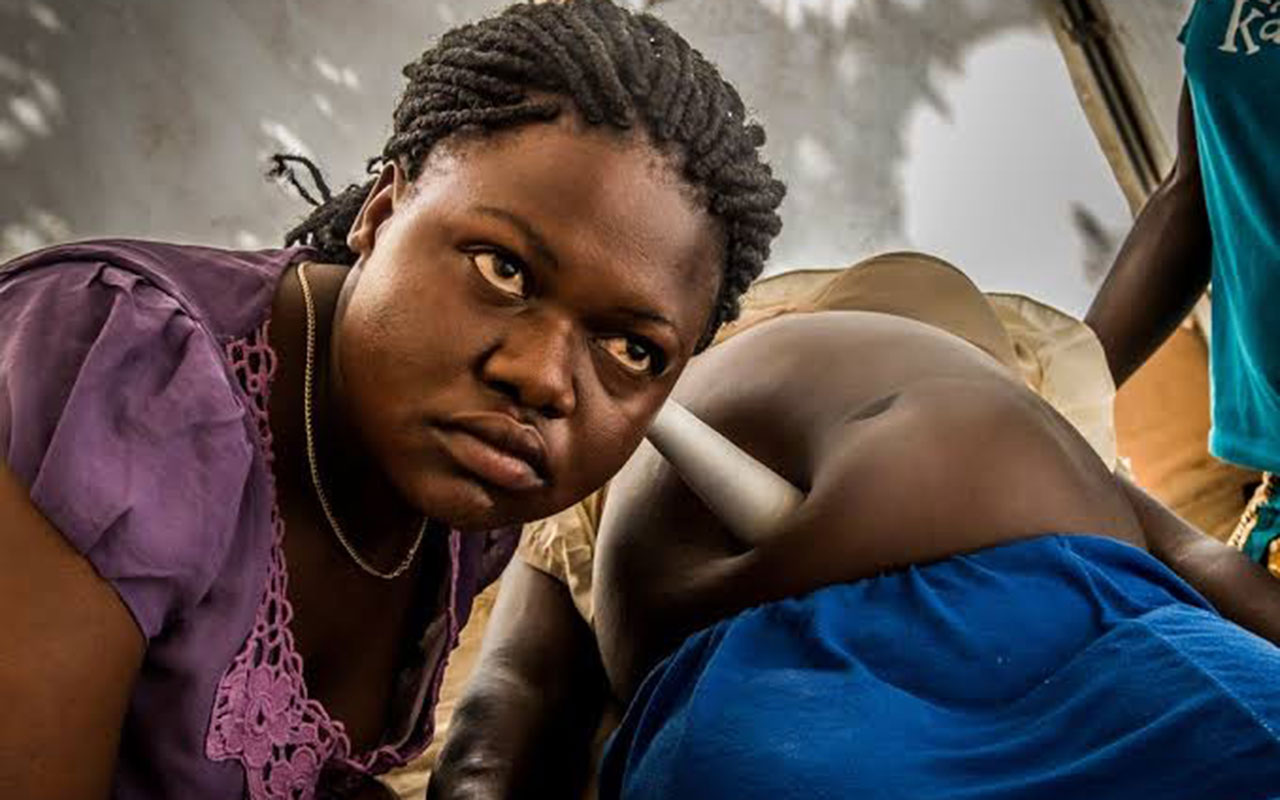 Despite advances in modern healthcare practice, Traditional Birth Attendants, an age-long go-to facility for pregnant women continue to thrive. With challenges faced in the Nigeria’s healthcare system, and the goal to improve maternal and child health outcomes, barriers and opportunities responsible for this thriving form of childbirth is examined. IJEOMA THOMAS-ODIA writes.
Despite advances in modern healthcare practice, Traditional Birth Attendants, an age-long go-to facility for pregnant women continue to thrive. With challenges faced in the Nigeria’s healthcare system, and the goal to improve maternal and child health outcomes, barriers and opportunities responsible for this thriving form of childbirth is examined. IJEOMA THOMAS-ODIA writes.
For Irene Peters, a mother of three, “I had my two babies in a prayer house, when it was time for my third baby, and because scan had told me I should is a baby boy, I chose to go to a hospital to register, but as I approached my delivery date, I was told that my baby was lying in a wrong direction that won’t allow for vaginal delivery and so they advised I opt for Cesarean Section. I didn’t want it and so I ran back to the prayer house and thankfully with intense prayers, they did well to redirect my baby to my birth canal and I had my baby there safely.”
Hannah Bello, a 31-year-old mother of two, said: “I never rely on hospitals for childbirth, if I don’t go to my Alagbo, it doesn’t seem right.”
For Bello, having her children with the help of local medicine and Traditional Birth Attendants (TBAs) was a tradition passed to her by her mother, which her mother-in-law affirms.
While noting that she has had smooth deliveries with her two pregnancies, Bello said, “I didn’t have any complications or need to stick with a hospital for delivery though I registered at a nearby health centre as I was advised and I prayed hard that there would be no emergencies.”
A senior journalist in one of the country’s leading newspapers, who chose to remain anonymous said, “I had all my kids outside of the hospital. I believe in faith centres. My wife registers for antenatal, but for birth, it is the church. My first three kids were in a Christ Apostolic Church (CAC), my sister even had her two children there, and my last two were in The Redeemed Christian Church of God (RCCG). I’m more comfortable with them.”
Another journalist in the same newspaper said, “I use the church for all my deliveries. I don’t go to hospitals. But my wife registers for ante natal and whatever is needed. She goes for checkups, but for birth, it is no-no.”
Why?
He said, “there are more to childbirth that can be imagined. There is one hospital that I know in Alimosho area of Lagos, the only way they know how to deliver is Caesarian Section (CS). For every 10 births, CS is always like six, and you ask, is it that women no longer labour or push to have kids?”
This is a few of the many reasons more women are drawn to this form of delivery, which seem to be on the rise despite their level of education and awareness on the benefits of having babies in registered healthcare centres, even as there are several cases of maternal mortality as a result of not presenting self to a primary healthcare facility as at when due.
Data from the Nigeria Demographic and Health Survey (NDHS) indicate that many pregnant women in rural Nigeria use TBAs rather than Skilled Birth Attendants (SBAs) for maternal healthcare.
According to the World Health Organisation in 2015, Nigeria’s estimated maternal mortality rate of 814 per 100,000 live births is one of the highest in the world and it is partly attributed to the low use of skilled professionals for antenatal and delivery care. Hence, WHO recommends the use of skilled birth attendants to improve the likelihood that pregnancy complications will be better managed, and therefore, reduces risk of maternal mortality.
While TBAs have for a long time, provided delivery care in many communities in Nigeria, being especially prominent in communities with low SBA availability, 2018 NDHS reports that more than 20 per cent of births were assisted by TBAs.
A retired public health nurse and midwife, Oluwatoyin Odukoya, said, “if I’m not exaggerating, about 65 per cent of pregnant women in Nigeria, in Lagos State especially, patronise them, because beliefs and influences are responsible. The belief is that when you go to a traditional birth attendant, she has herbs, roots, and incantations that she will chant, that at the end of the day when you want to have your baby, there won’t be any problem, this belief is real for both educated and uneducated mothers.
“Now, what they do, since we have a traditional medicine board that is training them; before now, it was WHO that did the training with the help of midwives, which we did and gave them kits. But we discovered that even with the kits they have their own mindset, and WHO categorically stated that they are untrainable, so they stopped training and supporting traditional birth attendants.
 “However, because of what we have in some councils, where Public Health Centre (PHCs) is far from the people, and even if it is close, it is about five to six kilometres away; and then, there is the traditional birth attendant that is very close to their house. Some organisations then came up and started training them with the Traditional Medicine Board. However, those who were trained are just minute, out of the number of people practicing, but because of our beliefs in society, that they have extra power, that’s just it. I also see that they don’t come cheap; they are even more expensive than the PHCs.
“However, because of what we have in some councils, where Public Health Centre (PHCs) is far from the people, and even if it is close, it is about five to six kilometres away; and then, there is the traditional birth attendant that is very close to their house. Some organisations then came up and started training them with the Traditional Medicine Board. However, those who were trained are just minute, out of the number of people practicing, but because of our beliefs in society, that they have extra power, that’s just it. I also see that they don’t come cheap; they are even more expensive than the PHCs.
Odukoya also noted that when she was still in active service, some of the PHCs agreed that any TBA that refers a case to us, the PHC board gets a sum of N5,000, “but they still won’t come. So, what was done was that we go to the TBAs and ask them to register at the PHC as it was free – we don’t ask for blood donations, so, they would just register and have those cards, but they will not attend clinic. On the day of delivery, when they have complications, they now bring their cards, and the TBAs will now refer them to the PHC.”
On dealing with such cases, she said “there’s not much you can do; when you examine them, and you see that complications have already set in, you send them to a secondary level, but the most unfortunate thing is that, after sending them to the secondary level, they put the blame on the PHC system – that is what we normally face. This is a case of someone who registered and never showed up until the point of complication which we are not equipped to handle at the primary level.
“So, we have to take the patient to the secondary level. Even if you write it in your referral paper, our people at the secondary level will not take the time to read what we wrote. You will just see them placing the blame on the primary healthcare services. Those are the things we face. In most cases, some nurses will just give them referral paper and say they should go. Some organisations have started training and retraining these TBAs, and we just hope for the best. There’s not much we can do.
A medical doctor and Lead at The Health City, Odunola Olabintan, stressed that there are different reasons why people patronise TBAs, one of them being financial power. “You find that a lot of people cannot even afford to go to general hospitals, or federal hospitals, when they are pregnant, even to do their antenatal. With the economic hardship that we are facing now, it is even worse. And people are scared of the possibility that the pregnancy ends up in Caesarian Sections, and they are then convinced that TBAs are the best option as they reassure them that they would have an uneventful pregnancy.
“And there is of course the place of culture and tradition especially for women, whose parents gave birth to them with TBAs, and there are more of these attendants around them that they have known for a long time; especially, when the TBAs claim to have had no incidents. The statistics are clear, that most women would have an uneventful pregnancy, but for those women that are going to have complications; they are the reason we try as much as possible to find a synergy so the birth attendants can refer them to health centers on time, because for most of these TBAs, even though they claim not to have an incident, most of them just send out women that would have incidents early, so that the complications wouldn’t fall on them, and affect their ‘reputation’ so to speak.
 “So, not having financial power, the place of culture and tradition, and also the place of beliefs all have a role to play. Some people believe that if you go to a hospital to give birth, you will most likely end up in a Caesarian Section (CS), and they believe that with TBAs, they can help you deliver more naturally, which is really wrong. These are some of the reasons why there are still a significant number of people patronising traditional birth attendants.”
“So, not having financial power, the place of culture and tradition, and also the place of beliefs all have a role to play. Some people believe that if you go to a hospital to give birth, you will most likely end up in a Caesarian Section (CS), and they believe that with TBAs, they can help you deliver more naturally, which is really wrong. These are some of the reasons why there are still a significant number of people patronising traditional birth attendants.”
Dr. Olabintan noted that while she hasn’t had an experience, she knows women who have given birth with TBAs successfully, “I also know women who have developed complications as a result as TBAs are not equipped to manage any complications.
“If you go for antenatal at a TBA, they will not check your blood pressure, blood sugar, they won’t even know if you have hypertension or diabetes in pregnancy, or if something is wrong with the baby. They don’t have that equipment. So, women that will develop complications will not be picked up early, and it will be at a place when they are already in labour, and they have an obstructed labour before they present to the hospital, and the baby might have even died.
“What we can do to encourage women to embrace hospitals is to make the services cheaper. Any serious government that wants to curtail maternal mortality and care for women would do so. Pregnancy is not a disease, and for women it is a thing of joy, and it would be nice to have these services discounted to the bare minimum, and also convenient. There are hospitals that run antenatal clinics, just twice a week, and you find out that there are long queues of women just waiting outside to see a doctor. That, sometimes, discourages people from coming to the hospital to do antenatal checkups, except they even have a very serious complaint.
“I would suggest that we have more time for antenatal clinics, more convenient time, even running till evening, so that women that have to go to work can come back and still see the doctor, and it should be discounted as much as possible even to the point of delivery.”
She added, “I know some governments have implemented this in the past, and to the point when you have to deliver. I think the Lagos State Government is working around something like that. So, when you deliver, even if you have to do a surgery, or CS, it should also be discounted. I am aware that a couple of months ago, delivery at the maternal hospital in Lagos Island is done for free and so, they had a lot of women coming to deliver there, and that should tell you something. Sometimes it’s just that women don’t have the financial power.
“The effect of patronising TBAs is that if you have complications, it will not be picked up early, and the test that you are supposed to do, even to determine if the pregnancy is viable and if the baby is growing well or to determine any abnormality; all these things are done routinely at antenatal, and you don’t have that with TBAs and they don’t have facilities to carry out surgeries and complications.
“Like I said, most pregnancies go uneventful, but for those that would develop complications, they don’t have the facilities to manage them. If you need a blood transfusion, or are anaemic in pregnancy, they can’t manage it well. TBAs are very risky, but if we can’t eradicate them fully, we can work synergetically with them. I know the Lagos State Government has trained TBAs. So, if they see complications, they can refer on time and not put these women’s lives at risk.”
For registered nurse and midwife, Esther Chimashalim Obi, she noted that there has been an increased effort by stakeholders to reduce the number of people patronising TBAs, however, the number is still on the increase reasons ranging from the poverty, ignorance and cultural beliefs, and hospital policies especially government hospitals.
“The poverty level in the country has driven lots of pregnant mothers and would-be mothers into the hands of quacks as lots of the populace cannot afford to pay for hospital bills in the government hospitals despite the so-called subsidy in place or standard private facilities. Accessibility to proper healthcare facility is another great factor as the roads are in a deplorable state, where people have to travel to access care under extreme conditions so they settle for what is available which is the TBAs in the community, especially if a respected member of the community has patronised the service before.
 “There are cultural beliefs that has pushed so many to believing that these TBAs have superior powers to general medicine and as such have geared their mind towards believing that these TBA are able to do the impossible, which I also term as ignorance. Imagine someone saying that because goats give birth unaided a woman in labour who needs an emergency C-section due to obstructed labour should have one done. Sincerely so many lives have been lost, women and children maimed because of accessing or patronising these so called ‘demi-gods’ TBAs.”
“There are cultural beliefs that has pushed so many to believing that these TBAs have superior powers to general medicine and as such have geared their mind towards believing that these TBA are able to do the impossible, which I also term as ignorance. Imagine someone saying that because goats give birth unaided a woman in labour who needs an emergency C-section due to obstructed labour should have one done. Sincerely so many lives have been lost, women and children maimed because of accessing or patronising these so called ‘demi-gods’ TBAs.”
Obi said that the Lagos State government is doing quite a handful to reduce these occurrences, “but sadly I would say these efforts is not enough in her perspective as a State and a Country with so much wealth that has been swallowed up by some greedy lots leaving this populace in abject poverty.
“Health, they say is wealth. The government at large both Federal, State and Local level should invest more in Maternal health, eradicate hospital policies that discourages people from accessing healthcare freely and quickly so as to encourage the people. More public awareness is still required and boosting the morale of healthcare professionals working in these fields especially midwifery practice is necessary.
“There is still a lot to be done to encourage people to embrace the hospital environment, the government should put things in place that will make healthcare services more efficient, machines that can carry out tests quickly, eradicate the obsolete ones, imagine when women have to spend hours in government hospitals for antenatal bookings. Employ more staff, equip them and make their jobs easier by putting things in place, create a great working environment and pay staff good wages to encourage them put in their best and prevent this brain drain that is hitting the health industry rather than coming up with laws that are aimed at restricting people and infringing on their human rights to choose what to do after acquiring education.”
While acknowledging the existence of prayer houses used as delivery centres, Obi said, “the attraction to these prayer houses is narrowed down to our belief systems and poverty, because these prayer houses do not charge delivery fees so the average person wants to go for something cheap. There should be a system in place where these houses are totally closed down and if not get professionals to go in there and administer healthcare after prayers have been done.
“The educated ones who patronise these TBAs do so out of ignorance which I can still narrow done to our cultural beliefs. There should be a great re-orientation in our society. People should be made aware of the implications of these quackery. I will tell you some sad experiences I have had, someone in the neighbourhood went to one of the TBAs to deliver and had retained placenta, and was bleeding heavily, thank God the husband was smart enough to put a call through to me asking for my opinion and straight I moved the woman out of the place to a facility where the needful can be done and when I asked why they patronise such because in my opinion these fellows are enlightened, my findings were that they could not afford the standard facility because the pregnancy was not really planned for, secondly someone who has been to the TBA before convinced her that the place is cheap and accessible and has a good success rate.
“To be candid, the effects of patronising TBAs in the community has done a lot of damage, some will argue this with me but I can tell you categorically that there has been lots of damage than good. You can visit the general hospitals and have a good look at the referral cases coming in and it would amaze you that a higher percentage are from TBAs where they have been mismanaged and at the end when they think the woman might just die and they don’t want that to happen in their custody so as not to tarnish their image in the community, they send them out. We have seen lots of women with pregnancy induced hypertension, gestational diabetes with macrosomia in babies that would have benefited from having C-section done just wasting away, ending up with loss of mother and child or having deformed babies. It is a menace in our community and there is lot more that should be done.”
Similarly, a nurse, midwife and founder, Pregnancy Lounge, Tosin Matthew-Akinsiku affirmed that some of the factors contributing to the increased number of pregnant women visiting the TBA for services include poverty, as some of these women find it hard to make ends meet in order to care for themselves and the children, hence the inability to transport themselves to the hospital or PHCs for medicine, care and services.
“Tradition which is a way of life have a lot of people strongly believe in herbs and their heritage. Also, overtime, these women have built a bond between themselves and the TBA. They trust and enjoy the care and support they receive from TBA. For women who visit and deliver their babies in prayer houses, because of the free access to consumables and they get support from heads and members, complication or death could arise, if situations aren’t promptly attended to within a speculated time, knowing that they have limitations to the service TBA offers.”






